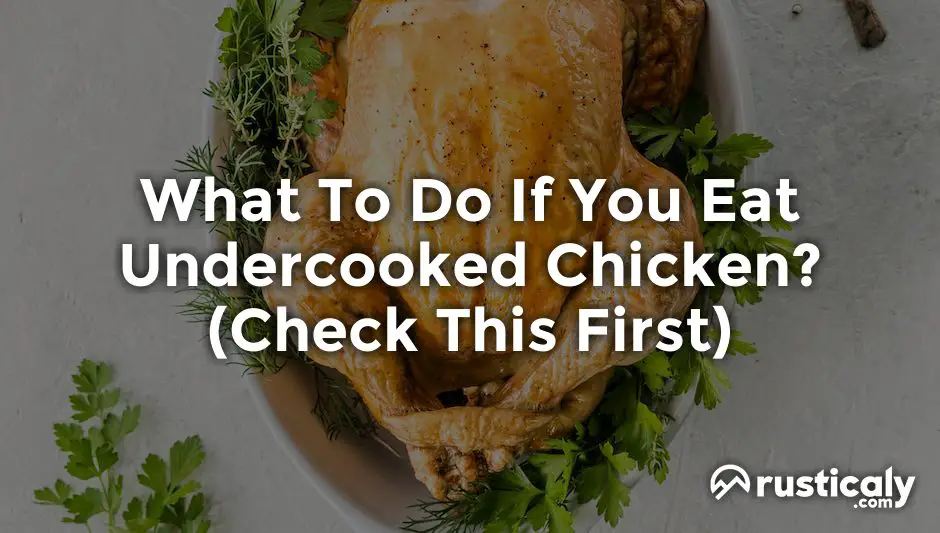Eating undercooked or raw chicken can lead to foodborne illness, also known as food poisoning. Chicken needs to be cooked thoroughly to kill any bacteria present. If you accidentally ate undercooked chicken, there are some steps you should take
Monitor Yourself for Symptoms
After eating undercooked chicken, pay close attention to your health over the next few days Symptoms of food poisoning usually start within 12-72 hours Watch for stomach cramps, nausea, vomiting, diarrhea, fever, chills, and fatigue.
If you experience mild symptoms, try to rest and stay hydrated Severe dehydration, bloody stools, high fever, or symptoms lasting more than 3 days may require medical attention
Treat Food Poisoning Symptoms
If you do develop food poisoning after eating raw chicken, focus on relieving the symptoms. Stay hydrated by sipping water, broth, or electrolyte drinks like Gatorade. Over-the-counter medications like Pepto-Bismol can help control diarrhea. Get plenty of rest until symptoms subside.
“So, if you’re having diarrhea, nausea, cramps—the usual food poisoning problems—start following a bland diet and stay well hydrated with water and electrolyte drinks until symptoms improve,” says Dr. Adrienne Bonheur, a Mayo Clinic expert. Most food poisoning cases will last up to a week.
Disinfect Surfaces and Utensils
After handling or eating raw chicken, be sure to fully disinfect any surfaces, utensils, and cutting boards that may have touched the raw meat. Use hot soapy water, then sanitize with a chlorine bleach solution. This kills any lingering bacteria and prevents it from spreading.
Wash your hands thoroughly with soap and warm water after touching raw chicken. Don’t reuse any marinades used on raw chicken unless they are boiled first.
Call Your Doctor
See a doctor if food poisoning symptoms last more than 3 days or you have signs of severe dehydration like dizziness, excessive thirst, dark urine, or inability to keep fluids down. People at high risk for complications should also see a doctor—this includes older adults, pregnant women, infants, and those with weakened immune systems.
In rare cases, severe food poisoning can lead to reactive arthritis, blood infections, or neurological problems. Your doctor may want to test your stool or blood for bacteria and may prescribe antibiotics if needed.
Check the Rest of the Meal
If you ate chicken that turned out to be undercooked, check whether other components of the meal like sides or sauces containing chicken or eggs may also be unsafe. Discard anything that touched raw chicken juices.
Thoroughly cook other chicken, meat, fish or eggs served at that meal to 165°F. Even salads could be contaminated if chopped on an untreated cutting board. When in doubt, throw it out.
Learn Proper Cooking Temperatures
To avoid undercooked chicken in the future, invest in a food thermometer. Chicken is safe to eat at 165°F. Ground meats like beef or pork should reach 160°F, while steaks and chops only need 145°F. Seafood is done at 145°F.
Poultry should not be left at room temperature for more than 2 hours total before cooking. Defrost frozen chicken in the refrigerator, not on the counter. These tips prevent bacterial growth.
Know the Risks of Undercooked Chicken
Eating raw or undercooked chicken can lead to illness from bacteria like Salmonella, Campylobacter, and Clostridium perfringens. Poultry products are the most common cause of food poisoning in the U.S.
Symptoms typically last under a week but can be life-threatening for at-risk groups. In rare cases, reactive arthritis or Guillain-Barre syndrome may develop.
Take care to fully cook chicken to avoid foodborne illnesses. If you do eat undercooked chicken, monitor yourself carefully and see a doctor if severe symptoms develop. With proper handling and cooking, chicken can be a healthy, safe addition to your diet.

How to properly store raw chicken
If you’re refrigerating raw chicken, keep it in its original packing for no more than two days, says DiGeronimo. “Store your raw chicken on the bottom shelf of the refrigerator, away from any fresh fruits, vegetables and other foods,” she says.
If you’re storing your chicken longer than two days, it’s best to freeze it, she adds. And, yes, you can freeze it in its original packaging. Just be sure to thaw it out over time in your refrigerator and cook it as soon as it’s thawed.
How to protect yourself against food poisoning
The big thing about protecting yourself from food poisoning, DiGeronimo says, is making sure you cook your chicken to an internal temperature of 165 F. Don’t just trust your instincts when cooking; use a clean meat thermometer for accurate temperature readings.
Besides properly cooking your chicken, though, there are other ways to make sure your chicken stays fresh.
How long after eating undercooked chicken will I feel sick?
FAQ
What should I do if I ate a piece of undercooked chicken?
If you’ve consumed undercooked chicken, take immediate action by stopping consumption and monitoring for symptoms of food poisoning like nausea, vomiting, or diarrhea.
What to do immediately after eating bad chicken?
- Let your stomach settle. Eat after your stomach is settled and you are hungry again.
- Replace fluids. Replace fluids with water, sports drinks, juice with added water or broths. …
- Ease back into eating. …
- Avoid certain foods and substances until you’re feeling better. …
- Rest.
Will I be okay if I ate slightly pink chicken?
All that matters is the temperature, not color.
The USDA recommends that all poultry be cooked to an internal temperature of 165 degrees to reduce the likelihood of foodborne illness, though dark meat can be juicier at temperatures up to 195 degrees.
How soon after eating undercooked chicken will I be ill?
The symptoms usually start within a few hours or a few days of eating food that caused the infection. Sometimes symptoms do not start for a few weeks.
